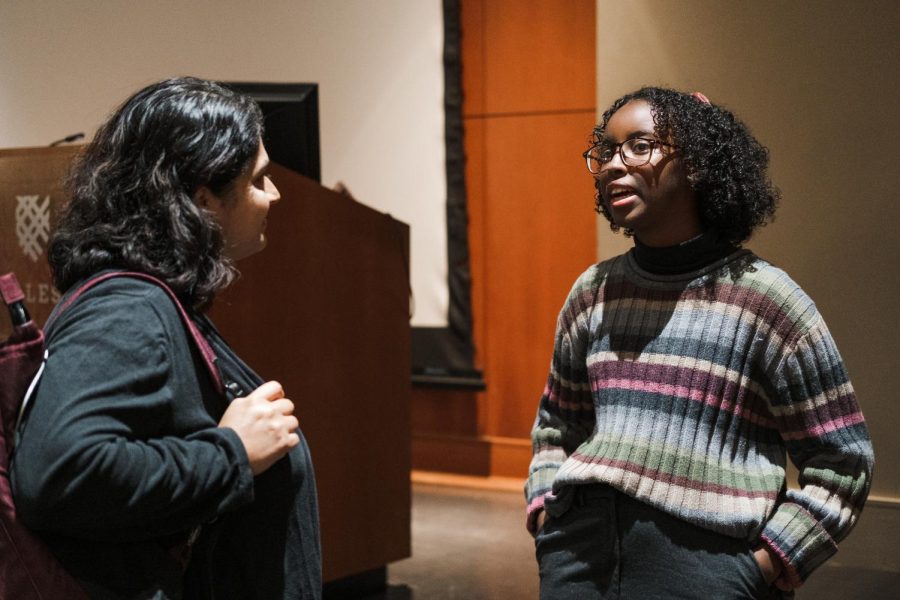Isra Hirsi visits Mac, speaks out on justice issues in climate movement
October 10, 2019
Shortly before noon on Thursday, Oct. 3, students made their way to the John B. Davis lecture hall in the lower level of the Campus Center, where Isra Hirsi, the 16-year old co-founder and Co-Director for the U.S. Youth Climate Strike, was preparing to give a talk titled “The Climate Crisis Affects Me and You: The Intersections of Climate Activism with Isra Hirsi.”
“When talking about intersectionality or black and brown people and how climate impacts them, it’s often seen as ‘you’re separating yourself from white people; you are excluding white activists; you’re against them,’” Hirsi said. “My answer for them is: if everyone was talking about these issues, then this wouldn’t be a problem in the first place.”
Despite being a junior in high school, this was not Hirsi’s first time addressing a large audience. Just two weeks prior, she spoke at the Minnesota Youth Climate Strike at the state capitol in St. Paul, which drew thousands of students, activists and other demonstrators advocating for climate action. The next day, Hirsi travelled to the United Nations Headquarters in New York City to attend the Youth Climate Summit.
Biology professor Mary Heskel invited Hirsi to speak on campus, citing the broad impact she has had in her brief public life.
“Isra has had more cultural and societal impact on the dialogue on climate change in the last year than many climate scientists have their entire careers,” Heskel said. “And I say this as a scientist who studies the impacts of climate change.”
Hirsi discussed her personal history with climate activism. After joining her school’s green club, she became involved with the iMatter Youth Movement in Minneapolis, an organization focused on city-centered solutions to the climate crisis. In 2018, she joined Minnesota Can’t Wait, which advocates for a statewide Green New Deal.
In January 2019, Hirsi teamed up with a friend from Colorado to address issues of representation in the climate advocacy community.
“The one problem with all these [climate advocacy] groups was that they were extremely white-dominated and lacked intersectionality,” Hirsi said. “I was probably one of the only black people in those groups.”
The two coordinated with young people across the country to build a nationwide movement that became U.S. Youth Climate Strike. The September strike drew over 100,000 people across the United States.
Hirsi hopes her advocacy will help build a platform for under-privileged communities to speak out about the way the climate crisis affects non-white people.
“There was a study done in 2014 by the [University of Minnesota] that found people of color exposed to 38% higher levels of nitrogen dioxide outdoor air pollution compared to white people,” Hirsi stated. “We know that black and brown low-income communities are hit the hardest.”
“There is a reason why communities that are gonna be impacted by things like pipelines aren’t getting to be put up on the stage, and that is a problem we all need to recognize and address when talking about our activism,” she continued. “These communities deserve to be heard and that’s not what’s happening right now.”
The rest of the hour was devoted to questions from the Macalester community.
Hugh Gabriel ’23 was inspired by Hirsi’s devotion to the cause.
“If Isra can lead a climate movement at age 16, what excuse do I have?” Gabriel said. “I left feeling motivated to take more action.
“Isra’s brilliance lies in her no-nonsense approach, genuine character, and ability to speak truth to power — all while attending high school,” Department Coordinator for the Civic Engagement Center Rachel Weeks said. “On top of it, she is exceedingly humble and makes it clear that everyone has the potential to be an organizer or contribute in meaningful ways.”













